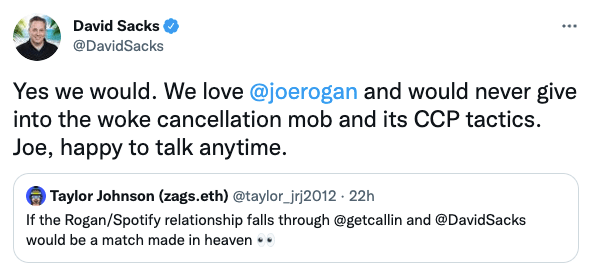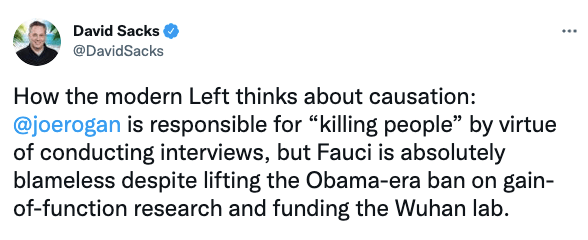Regardless of which podcasts you enjoy listening to, you should have caught wind of the Joe Rogan situation by now.
The Rogan-related Spotify saga has been burning long enough now that it’s worth taking a moment to sit back, consider the larger picture, and try to piece together the economic forces behind the kerfuffle. This morning, let’s talk about platforms, publishers, market reactions, and how people voting with their agency is not the same thing as the Chinese Communist Party.
Understanding the Spotify mess
Spotify was early to the music streaming business and has done very well for itself. I say this as a long-term Spotify user, fan, and general believer in streaming music. I happen to think that streaming access to music is underpriced, in part because Apple is able to maintain a price ceiling due to its hardware-generated wealth, but that’s a different matter.
The Exchange explores startups, markets and money.
Read it every morning on TechCrunch+ or get The Exchange newsletter every Saturday.
Music streaming is a commodity business. This means that many platforms have mostly the same music on offer and charge a roughly similar price. This is a tricky situation for artists to be in, as they are torn between not offering their music where fans have congregated (streaming services), and accepting prices that many consider are too low for their art (Spotify streaming rates). Fair enough.
Spotify has a different issue stemming from the same roots: Because music is commoditized, it has minimal pricing leverage. That’s to say that it can’t charge $15 per month for the same thing that Apple charges $10 per month for.
 This means that Spotify’s economics are largely fixed, and that it can’t have too much of an impact on its gross margins with pricing changes. This limits its profitability, which isn’t good. So, the company embarked on an investing spree in the podcasting world, buying startups and shows in hopes of owning enough unique material in time that it could perhaps charge more for its service, thus improving its revenue quality and overall economic profile.
This means that Spotify’s economics are largely fixed, and that it can’t have too much of an impact on its gross margins with pricing changes. This limits its profitability, which isn’t good. So, the company embarked on an investing spree in the podcasting world, buying startups and shows in hopes of owning enough unique material in time that it could perhaps charge more for its service, thus improving its revenue quality and overall economic profile.
This is my read of the situation, but I don’t think that I am wrong.
As part of this podcasting push, Spotify spent a lot of money to bring Joe Rogan’s podcast to its platform in what the company called an “Exclusive Partnership.” The mountain of cash that Spotify spent on this was a wager, part its larger podcasting strategy, and was an editorial choice by the platform company.
That last point matters, because Spotify hosts nearly all music without exercising editorial control. Singer Chris Brown, who assaulted Rihanna, is still on Spotify and Apple Music, as a data point. But Spotify put a bunch of its own money to get Rogan as an exclusive, a different choice than merely streaming the same pile of tunes as other, competing platforms.
Rogan’s popular show has had a number of guests on it that many folks in the Spotify community, both customers and content providers alike, found objectionable. The latter camp made headlines when a few musicians decided that they would remove their tunes from the platform, in light of Spotify buying podcasting content that they vehemently disagreed for public-health reasons — we remain, today, in a pandemic, mind.
This put Spotify in a pickle. The company wants to have both a commodity music business and an exclusive podcasting business. But instead, its exclusive podcasting strategy was undercutting its core value proposition and revenue driver, namely offering most recorded music for a regular fee.
Sure, losing Neil Young and a few others would not constitute a platform-breaking amount of missing music, but if the trend continues, Spotify could become a bit underpopulated with music, sending its subscribers elsewhere. Apple Music, for example. Spotify needed to calm the waters, because if it lost music, no amount of Rogan fandom was going to be able to make the math pencil out — the company remains a music streaming service with a podcasting business, not the other way around.
So the company released its existing content rules, and said that it would append a note to podcasts that discussed COVID-19. And Joe Rogan made an Instagram video discussing the situation. In classic Rogan style, he made an affable clip that included digressions on his life, but he did say that he would try to host more views to balance out his more controversial guests.
Towards the end of his clip, he added the following after thanking Spotify and his fans: “Thank you to the haters, because its good to have some haters — it makes you reassess what you [are] doing, and put things into perceptive, and I think that’s good too.”
Agreed. The market is a pretty cool thing, with individual actors getting to make choices with their assets (music), and custom (where they choose to subscribe to streaming music). And when the market disagrees with one corporate choice or another, individual actors can help steer things. This is, well, how capitalism works.
And yet.
The sheer irony
And yet, David Sacks.
There are a few tweets worth discussing, because they show, I think, a somewhat rotten view of capitalism held by some of its leading lights. David Sacks is well-known in the startup world as an operator and investor, and I’ve heard several founders praise his knowledge and assistance rendered during interviews when they were working with him. Cool.
And yet, this:

And this:

A few things:
- In the first tweet, Sacks conflates individual actors in the market as a “woke cancellation mob,” and their exercise of economic agency as “CCP tactics.” This is batshit insanity. It’s fine if you don’t like how the market makes decisions. But when the market has a different take on something than you do, calling if Communist is childish, and frankly goes to show not only intellectual inconsistency, but also a pretty amazing lack of self-reflection.
- The second tweet is a little harder to parse, but it appears to be something of mishmash of Fox News Fauci-blaming, and a somewhat boring version of whataboutism.
Regardless of what you think about Spotify and Rogan, Spotify only paid him because they thought it was a good investment. And they are making their current choices because, again, they think that Rogan is the best way to make money. That’s fine! It’s how capitalism works! I just can’t stand putative capitalists getting pissy about the market doing what it is supposed to.
If Spotify didn’t want to get criticized for its editorial choices, it shouldn’t have made any. But it did, and being criticized for those choices is par for the course. VCs, for example, love to complain that the New York Times is too mean to tech companies. Well I know now what I am going to call those investors: A woke mob using Chinese Communist Party tactics!






























Comment